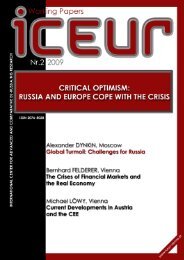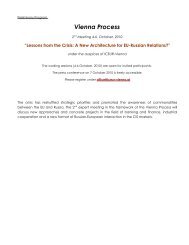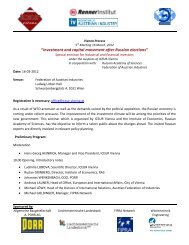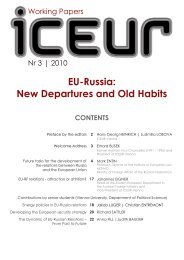International Center for Advanced and Comparative EU-Russia
International Center for Advanced and Comparative EU-Russia
International Center for Advanced and Comparative EU-Russia
Create successful ePaper yourself
Turn your PDF publications into a flip-book with our unique Google optimized e-Paper software.
Corporate <strong>and</strong> Group InterestsNot only interests which have condensed to a consensus on the national level influence <strong>for</strong>eign politics. Alreadyduring the 90s the strengthening of corporate interest in <strong>Russia</strong>'s international politics could be observed. Thedirect impact of these interests on the decisions <strong>and</strong> their implementation by state agencies remained animportant factor also during the following decennium.Corporate interests encompass economic industries, regions <strong>and</strong> different groupings within the governmentadministration. Only a small number of industry lobbies musters the necessary resources to influence <strong>for</strong>eignpolitics. This concerns the gas <strong>and</strong> oil industry, as well as the metal <strong>and</strong> defense industries. In 21st-century<strong>Russia</strong>, the gas <strong>and</strong> oil lobby is named as the most influential. The gas lobby can be called a corporate lobbywithout reservation. It blends with the political leadership's interests to such a degree that the corporate interestsof this lobby are positioned as the national interest in official <strong>for</strong>eign policy. It is by no means accidental that allinternational business contracts of the <strong>Russia</strong>n gas monopolist GAZPROM are under the strict <strong>and</strong> permanentcontrol of Premier Putin. At the same time, Gazprom's corporate interests are multifunctional. They go beyondthe purely economic <strong>and</strong> financial dimensions. The support <strong>and</strong> the promotion of Gazprom by the governmentpermits the leading elites to wield significant influence on those countries which consume <strong>Russia</strong>n gas ortransport it through their territories. This said, there are also cases where political <strong>and</strong> geo-political interests ofthe country's leadership have been detrimental to the economic interests of the gas lobby. Many observers havenoted that the change of the Ukrainian partners in January 2009 was certainly not dictated by economicconsiderations. The previous partner (RUSUKRENERGO) had done its duty, it had delivered gas punctually tothe consumers <strong>and</strong> paid its bills to Gazprom. This is in contrast to the state company selected as the new partner(NEFTEGAZ UKRAINY), which is subordinated to the Ukrainian council of ministers <strong>and</strong> does not enjoy areputation of dependability <strong>and</strong> strict contract fulfillment. Yet, when the new agreements on <strong>Russia</strong>n gasdeliveries to Ukraine were signed in January 2009, the <strong>Russia</strong>n leadership had decided to put its stakes onPremier Yuliia Timoshenko, in order to increase its influence within Ukraine. For this reason, the selection of anew partner <strong>for</strong> Gazprom was conducted despite its lesser financial <strong>and</strong> economic reliability.The corporate interests of the oil lobby in <strong>for</strong>eign politics are not enmeshed as closely with government interests.This may be explained by the fact that <strong>Russia</strong>'s oil industry comprises only a few large private companies. Theeconomic interests of a few of them can indeed wield decisive influence on individual <strong>for</strong>eign policy fields. Forexample, <strong>Russia</strong>'s present bid to develop the relations with Iraq is powered, in the first line, by the interest of thesecond largest oil company LUKOIL to gain access to the oil field Western Kurna. Simultaneously, theinterlocking interests of corporate oil interests <strong>and</strong> political interests of the power elite become more prominentas the position of ROSNEFT - a company with predominant state shareholding -is strengthening.By contrast, the influence of the metal lobby on <strong>Russia</strong>n <strong>for</strong>eign politics is less pungent. In African <strong>and</strong> LatinAmerican countries where it has its main interests, the lobby has to act on its own without proactive governmentsupport. Nevertheless, it enjoys official support where lobby interests open opportunities <strong>for</strong> the government toincrease its influence in specific regions <strong>and</strong> sub-regions. For example, this was the case in the botched attempt ofthe SEVERSTAL company to gain control over the leading European steel mill ACELOR.The influence of the defense industrial lobby on <strong>Russia</strong>n <strong>for</strong>eign policy is insignificant in comparison with that ofits role in the USSR <strong>and</strong> with other corporate interests. By <strong>and</strong> large, this becomes visible in the policies towardthe users of <strong>Russia</strong>n military hardware. Nevertheless, it is also true that as the influence of elitist geopoliticalinterest in <strong>Russia</strong>n <strong>for</strong>eign politics increases, so does the role of this lobby. The state companyROSTEKHNOLOGII is its most important representative. The diversity of corporate interests frequentlydetermines the competition between various regional orientations of <strong>for</strong>eign policies. For a long time, themilitary-industrial complex was the main lobbyist <strong>for</strong> an intensification of relations with China. Recently, theleading role has belonged to the oil company ROSNEFT as well as to the part of bureaucracy within the <strong>Russia</strong>ngovernment, which supports its interests of. In contrast to this, it is mainly gas interests, which determine therelations between <strong>Russia</strong> <strong>and</strong> Europe. When it comes to the economy, this element prevails over all other factors.The significance of the Chinese orientation <strong>for</strong> a long time was given by geopolitical interests. Nevertheless, theeconomic component increases its importance also in this <strong>for</strong>eign policy division.The interests of <strong>Russia</strong>n companies do not exist in a chemically pure <strong>for</strong>m, but are affiliated with the interests ofone or the other group within the ruling bureaucracy. This is why the infighting among the companies tosuperimpose their interests on <strong>for</strong>eign policies is often caused by the attempts of groups within the rulingbureaucracy at controlling different resources. The conflict of interests of various bureaucratic groups in thepolicies toward Ukraine is a striking example. The unfolding financial <strong>and</strong> economic crisis will probablyintroduce new elements to the structure of the interests of <strong>Russia</strong>n elite groups in the field of <strong>for</strong>eign politics.– 8 –









